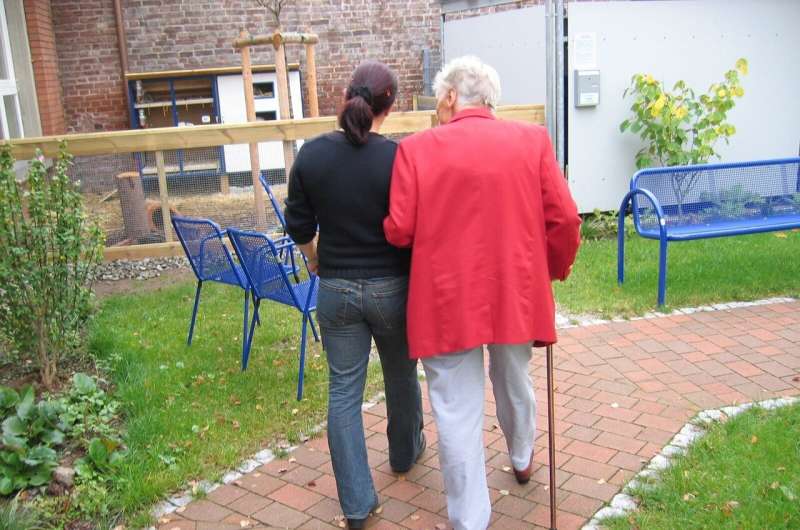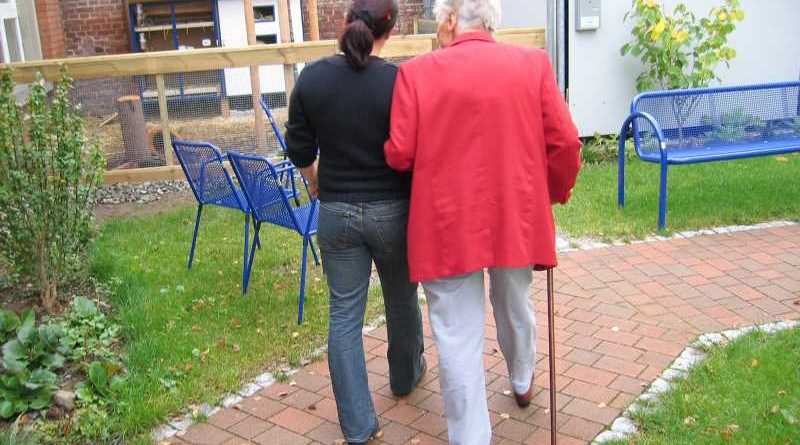The real cost to unpaid caregivers

Imagine two billion people working eight hours per day for no pay whatsoever. The fact is, you don’t have to imagine it because this is the reality of the global informal unpaid caregiving load.
Estimated to equal around 9% of the global gross domestic product (GDP), unpaid care contributes substantial benefits to economic and health care systems, but remains largely unrecognized.
Unpaid care work is variously defined but for the purposes of our latest research, informal caregiving is taken to be the provision of unpaid personal services to meet the physical, mental and emotional needs that allow a dependent person to function at an acceptable level of capability, comfort and safety.
As the COVID-19 pandemic highlighted, informal unpaid care is highly gendered. Women make up an estimated 80% of informal caregivers globally which includes physical care of a person—like their hygiene, medication and food—but also includes their emotional support and important decision-making.
In Australia, roughly one in 10 people (or 10% of the population) are informal caregivers—but this does not include childcare.
On top of this, more than a third of these caregivers are in their prime working years, aged between 35 and 54.
By providing much of the world’s care needs, these informal caregivers suffer personal economic and paid workforce penalties. But importantly, providing this informal care can also negatively impact the physical and mental health of caregivers.
Our review, recently published in eClinicalMedicine, worked to gather all of the evidence looking at the link between unpaid caregiving and the mental health of working-age adults in high-income OECD countries.
While previous reviews have suggested a negative association between caregiving and mental health, stronger longitudinal evidence was needed to substantiate the theory. Moreover, despite the highly gendered nature of informal care, earlier reviews lacked a gender lens.
Our review aims to address these key gaps.
We searched six databases and screened more than 4,500 records to identify 13 eligible studies with 133,426 participants from countries including Australia, the United Kingdom, the United States, Canada, Israel, Japan and a number of European countries.
All the included studies had be from high-income OECD countries so our sample group was made up of like-for-like people, and studies had to be longitudinal in design and compare caregiving with non-caregiving.
Overwhelmingly, our team found that unpaid caregiving is detrimental to the mental health of working-age adults. Where studies could be ordered by gender, caregiving was consistently negatively associated with mental health for women.
While few studies examined men, this negative effect was also reported for them.
All of the studies we included used validated, self-reported, survey-based measures of mental health. These measures are well-recognized mental health measures for depressive symptoms and psychological distress which are used to assess common mental disorders.
Of the thirteen studies, only two studies reported no association between informal caregiving and mental health—and none found it was beneficial to mental health. The remaining eleven studies all reported a negative association between informal unpaid care and mental health in at least one category or gender subgroup.
Overall, our review found that among working-age adults, informal unpaid care was detrimental to their mental health.
Numerous theories attempt to explain why informal care provision may adversely affect caregivers’ mental health. These include the multiple stressors many caregivers experience, the strain of juggling multiple roles that can lead to overload and the impact of time scarcity on the mental well-being of caregivers.
In addition, both the financial and time costs that come with the demands of caregiving can add to the negative impacts on mental health. Then there’s also the fact that many caregivers prioritize the health of the person being cared for, which can mean they don’t practice self-care or other positive health behaviors.
And finally, caregiving is emotionally laden. It’s intrinsically interconnected with the relationship between the caregiver and the person they’re looking after—a caregiver’s mental health can be additionally affected by the sheer worry and stress of someone they love and care about being unwell—known as the family effect.
The health of caregivers is a vitally important issue, and we need to better understand how best to help current and future caregivers.
Our work identified several avenues for future research. These include a need for better baseline data and stratification by gender, the inclusion of men and an understanding of the importance of the family effect when examining the mental health of caregivers.
We also identified a lack of studies examining caregiving for “healthy” people—like children and healthy adults or elders, which remains a notable gap.
Ultimately, our findings highlight the pressing need to help alleviate the mental health risks of caregiving in working-age adults. This is especially important given informal care needs are only increasing worldwide, both with the aging global population, as well as the ongoing demands of the COVID-19 pandemic.
Finally, while we need to understand the role of male caregivers better, the most pressing and urgent matter for policy change is reducing the disproportionate caregiving load on working-age women, with the aim of lightening the mental health load they currently carry.
More information:
Jennifer Ervin et al, Longitudinal association between informal unpaid caregiving and mental health amongst working age adults in high-income OECD countries: A systematic review, eClinicalMedicine (2022). DOI: 10.1016/j.eclinm.2022.101711
Journal information:
EClinicalMedicine
Source: Read Full Article



